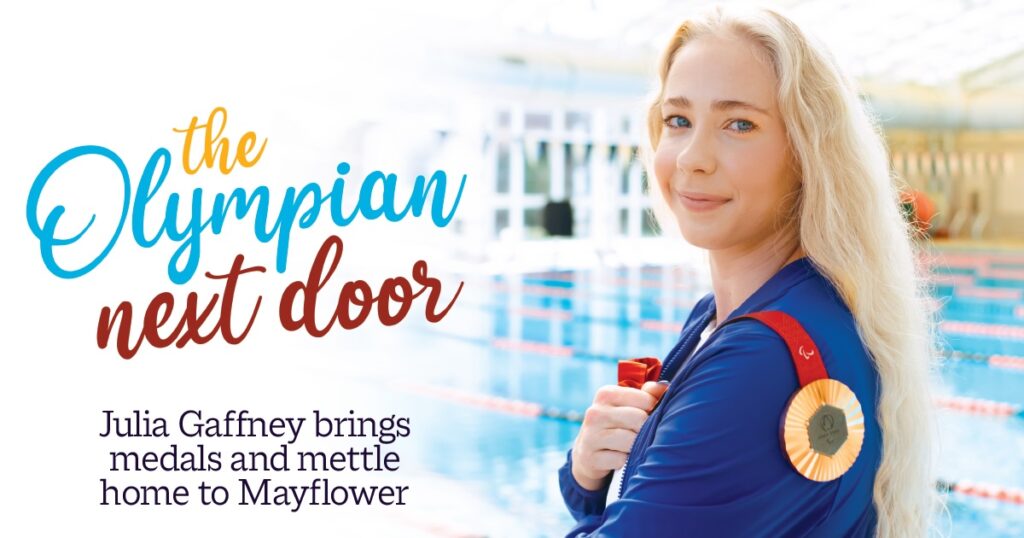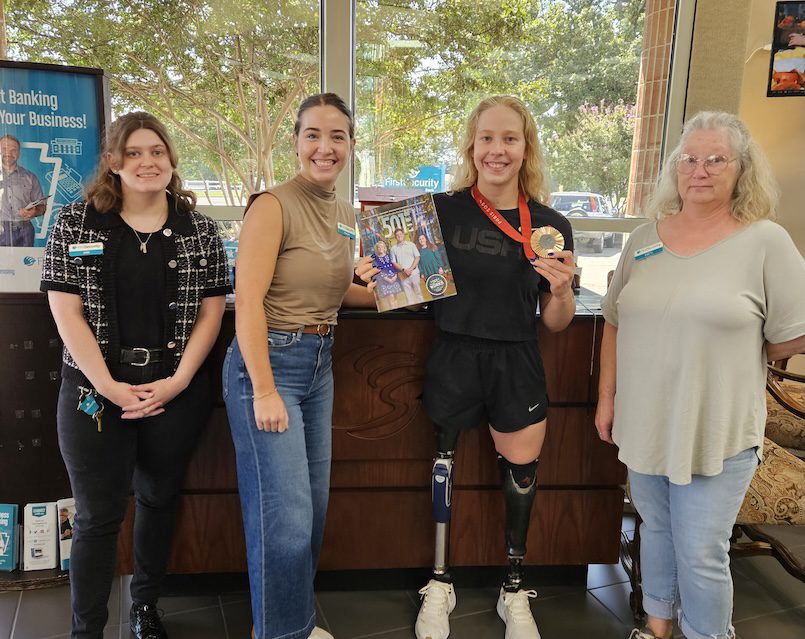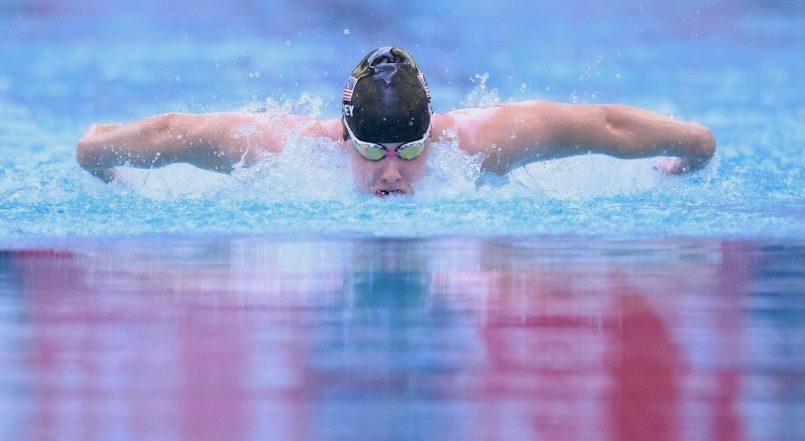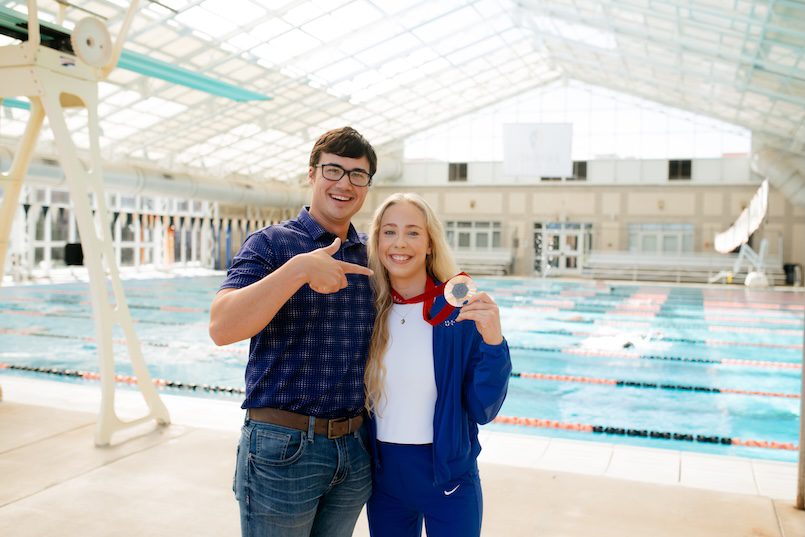30 Oct 2024 Julia Gaffney brings medals and mettle home to Mayflower
By Dwain Hebda
It’s a long way from Mayflower to Paris or Tokyo and back, but Julia Gaffney got there, 50, 100 and 200 meters at a time.
In less than a decade, Gaffney, 24, has qualified for two Paralympic Games, at which she’s medaled three times, and swam in four World Championships (2017, 2019, 2022, 2023), where she has amassed 13 medals, three of them gold.

As approachable in everyday life as she is successful in the pool, Gaffney has overcome all odds thanks to hard work, an indomitable spirit and a large, loving family of about 2,200 people who make up her hometown. She is, in every sense, the girl next door, albeit one who swims very, very fast.
“I’ve always had that attitude of just not giving up,” she said. “I’ve always had this kind of grit to me.”
Every Olympian can speak of challenges and sacrifices required for success, none more so than Gaffney. Born with her right leg gone from above the knee, and her left leg below the knee, she spent the first few years of her life in an orphanage in her native Russia. Recalling that chapter is the only element of her story that draws a cloud over her sunny personality. Asked if she has any recollection of that time and place, she said, simply, “I do, yeah. Just not great things.”

At age 5, she was adopted by Wisconsinites Kristin and Daniel Gaffney, who moved the family to Arkansas. Overnight, Julia’s life changed dramatically when she gained a new set of legs and five siblings.
“When I got adopted, we got my prosthetics as soon as possible. I think I was 6 when I started walking on them,” she said. “Before that, I actually just used my arms, and I think that’s part of how my arms just got so strong. Even when I got my legs, I still use my arms once in a while if I have my legs off.”
From the word go, Gaffney wanted to keep up with her active family and played youth baseball, softball and basketball in local leagues. “I was very competitive when I was little,” she said. “My mom’s favorite saying is something like—I had to be first and fast. Growing up with four brothers, I just wanted to be tough, like them.”
Eddy York was a volunteer coach in the baseball league where Gaffney played as the only girl among boys. He recalls the tough little center fielder showing her character early. “The first thing that drew me to the girl is her resilience,” he said. “We were playing a practice game, and she’s in center field, and one of my better hitters hits a nice shot. Julia makes an athletic move to catch this ball with all she’s got, and that ball hits her right in her mouth. Knocked out her front two teeth. It was heartbreaking. But it wasn’t long before she’s right back out there, playing ball again.”

York, who attended church with the Gaffneys, became one of Julia’s earliest mentors and biggest fans.
“The thing that separates Julia is how she took her disability and turned it into an ability, if that makes sense,” he said. “She just she never looked at herself like, ‘I’m broken.’ She wanted to get out there and do as much as she could.”
Fighting spirit aside, Gaffney couldn’t overcome the deficit her condition gave her in land-based sports, and by the time she was a teenager, she was looking for something she could excel at. From the second she hit the water, she was home.

“My mom was actually a college swimmer, and she was like, ‘I think swimming might be a really good fit for you. It would help you get all your energy out.’ I was like, ‘OK, why not?’” she said. “I was 14 when I did a little summer swim club in Maumelle, and then when I turned 15 in October, I joined a year-round club team in Conway. That was also the same year my mom found out about the Paralympics.”
Gaffney excelled right away. She narrowly missed making Team USA for the 2016 Paralympics in Rio de Janeiro and in 2017 exploded at the World Championships in Mexico City with a six-medal performance. Her former coach, Tony Marleneau, said in addition to her natural swimming talent, he was most impressed by her maturity.
“When she got the news that she’s not going [to Rio], it was kind of like a relief for her because she felt like she wasn’t ready,” he said. “But she was determined to be in Tokyo, and we made the goal of like, ‘Hey, we’re gonna be in Tokyo, and we’re gonna go get a medal.’ That’s when her mentality changed; she started thinking like a professional swimmer.”

Gaffney made the 2021 Tokyo games, but with the world still reeling from COVID-19, the atmosphere was nothing like what she’d imagined. Despite that, and a controversial call that disqualified her from her best event, she won two bronze medals and returned home to a hero’s welcome, complete with congratulatory banners around town and a parade. While appreciative of the support, Gaffney felt her accomplishment was hollow.
She dove back into training for Paris, this time buoyed by the support of her entire hometown, people like Linda Wyman, manager of the local First Security Bank, who are gaga for Gaffney.
“I did not realize I had so many people that cared about me and they were just excited,” she said. “It was also kinda hard because, in a way, I almost felt like a fraud. I have really high standards for myself and big goals, and I wanted to win the gold in Tokyo in the 200m individual medley. When I got DQ’d in prelims, my coaches tried to fight it but they were like, nope. I felt like I got a medal taken away. If I’d done well, I think I had a shot to win the gold or silver in that event.
“So, it was cool to have the community surround me and just be awesome, but at the same time I was kind of like, man, I don’t feel like I deserve this.”

“I met Julia after she came home [from Tokyo],” she said. “I was just totally blown away by this young lady, her smile, her positive attitude. I’ll never forget in our conversation, she looked at me and she said, ‘I don’t understand what the big deal is. I just went and competed.’ I looked at her and I said, ‘Julia, you’re a role model for this community. You’ve made us proud.”
This summer, as she overcame a nagging shoulder injury to win her third Paralympic medal and soaked in the hoopla of the Paris games with her family in the stands, Gaffney finally got that sense of fulfillment she had been chasing. She’s taken some time off since to recharge, but said she’s set her sights on another Paralympic Games—2028 in Los Angeles. She’s also starting to embrace her status as a role model.
“Honestly, I kind of love it,” she said. “I remember being that little kid, looking up to [athletes] and wanting to be one of them. I understand this is actually bigger than me and that I can inspire people behind me and I’ve accepted it, 100 percent. I love it.”
- The pinnacle of success - June 1, 2025
- Five-Oh-Ones to Watch 2025: Aaron Farris - December 31, 2024
- Julia Gaffney brings medals and mettle home to Mayflower - October 30, 2024








